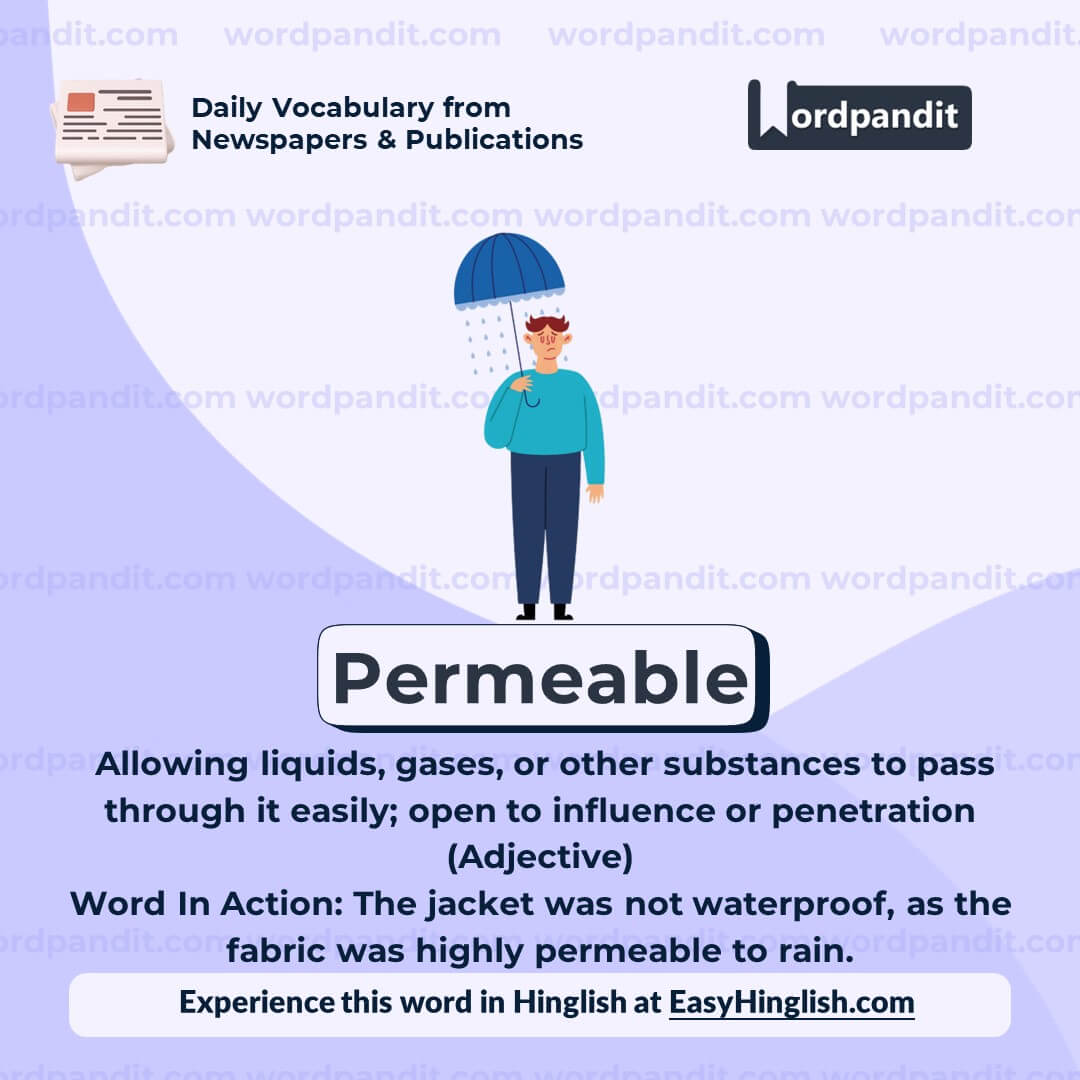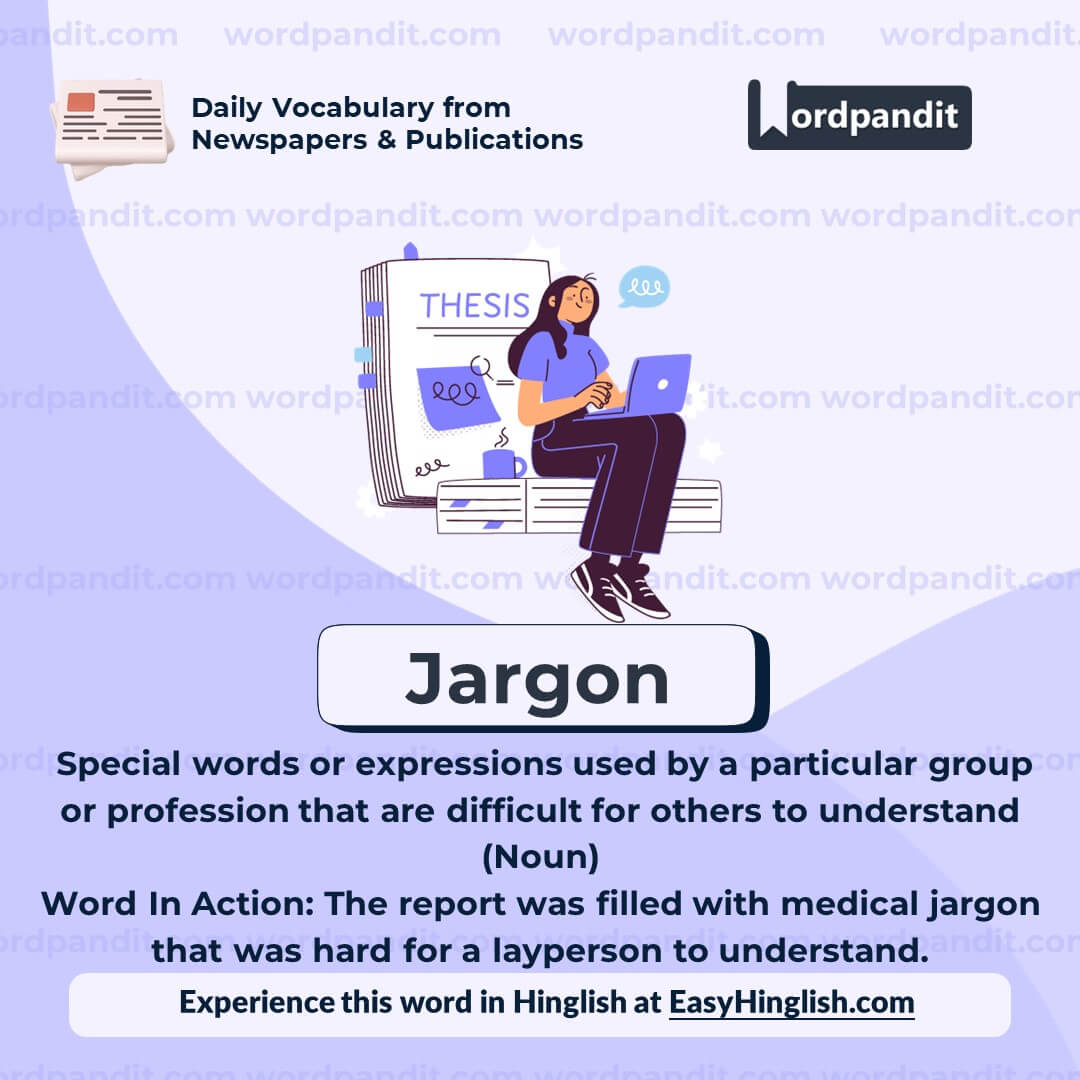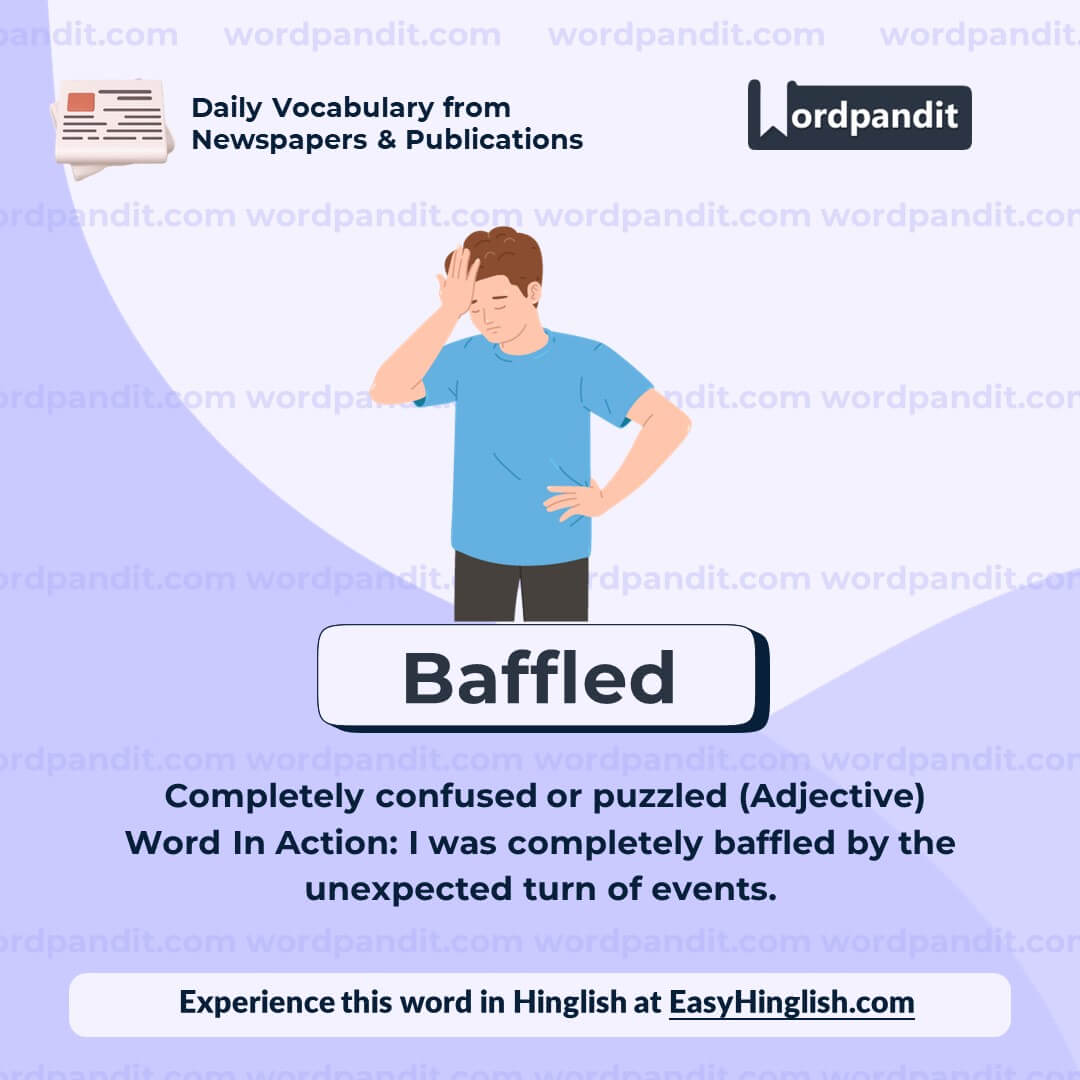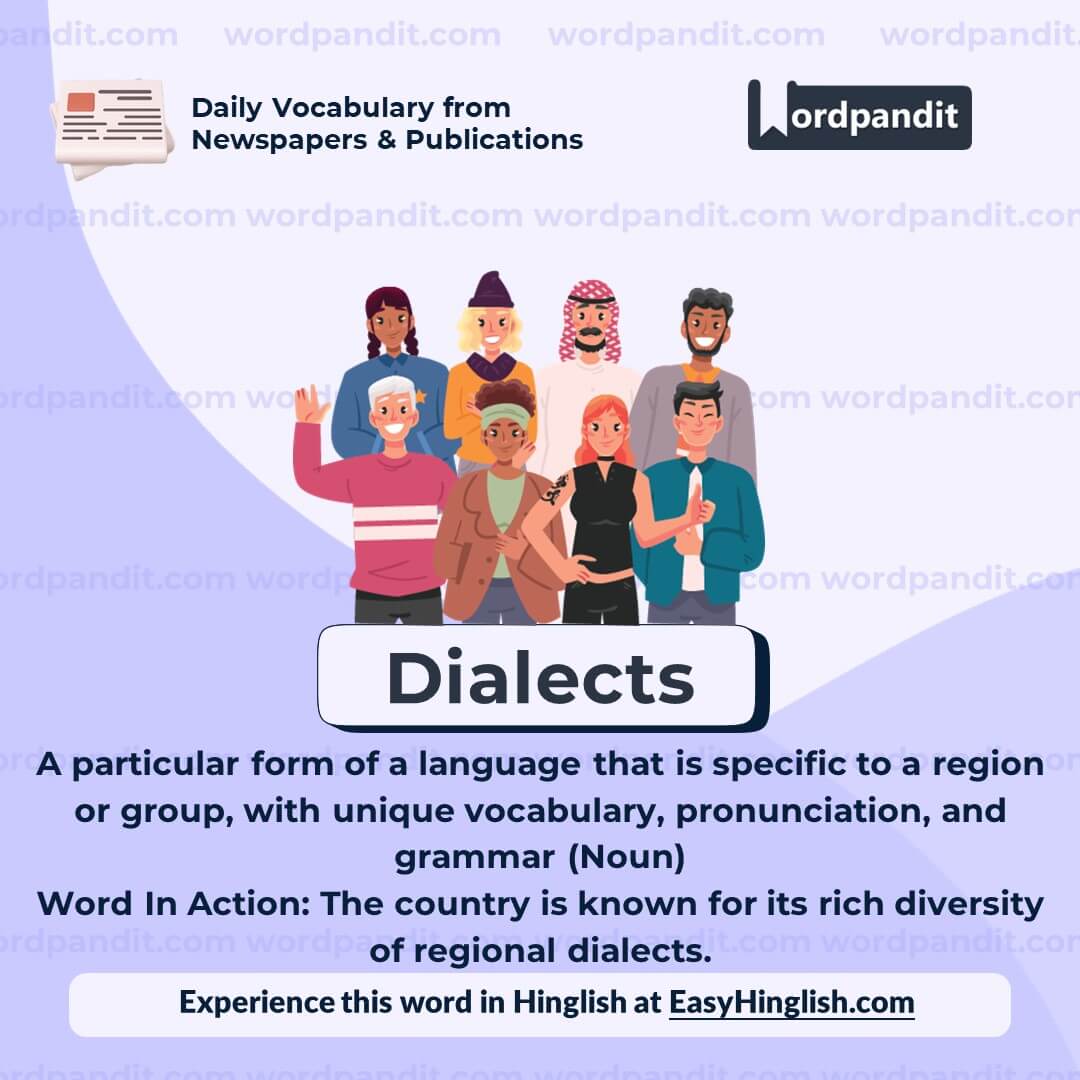Daily Vocabulary from International Newspapers and Publications
Expand Your Vocabulary with Wordpandit’s Global Vocabulary Hub
At Wordpandit, we are committed to helping you develop a truly global vocabulary by drawing from some of the most respected international publications. This section is designed to keep you ahead of the curve by introducing you to words that define global conversations and trends.
The Power of Global Sources
To help you think and communicate on a global scale, we curate vocabulary from renowned international sources, such as:
- The New York Times
- The Washington Post
- BBC
- The Guardian
- The Economist
- Scientific American
- Psychology Today
- And many more...
Stay Global, Stay Competitive
Our daily updates from international publications ensure you are consistently exposed to new words that reflect global news and developments, making sure your vocabulary is not only current but also globally relevant.
Enhance Your Global Perspective
Whether you’re preparing for international exams, aiming to excel in global business communication, or want to enhance your language skills for personal growth, Wordpandit offers the resources you need to thrive in a global context.
Effective Learning, Global Reach
Our learning methodology combines global examples, memory aids, and interactive activities, allowing you to internalize new words effectively and apply them in real-world scenarios.
Begin Your Global Vocabulary Journey Now!
Why Choose Wordpandit?
Practical Learning: Focus on words you'll actually encounter in real-world reading, enhancing your comprehension and communication skills.
Diverse Content: From current affairs to scientific breakthroughs, our varied sources expose you to vocabulary across multiple domains.
Effortless Integration: Make Wordpandit a part of your daily routine. Just a few minutes each day can significantly boost your lexicon over time.
Your Path to Vocabulary Mastery
- Visit our Daily Vocabulary section regularly
- Explore new words and their usage in context
- Practice incorporating these words into your own writing and speech
- Track your progress as your vocabulary expands
Start Your Journey Today
Embark on your vocabulary enhancement journey with Wordpandit. By consistently engaging with our daily posts, you'll build a robust vocabulary that serves you well in academic, professional, and personal contexts.
Remember, a word a day keeps linguistic limitations at bay. Make Wordpandit your daily companion in the quest for vocabulary excellence!
WORD-1: Permeable
Context:
"Described how new technologies and networks of connectivity had suddenly brought human communities closer together and made them permeable to an uncontrollable flow of people, ideas, goods and cultural practices, which all moved freely across the integrated markets of the world economy." - Aeon
Explanatory Paragraph:
The word "permeable" refers to the quality of something that allows substances, ideas, or influences to pass through it. It is often used to describe physical materials, like membranes or fabrics, as well as abstract concepts like borders, communities, or cultures that are open and receptive to external influences or changes.
Meaning: Allowing liquids, gases, or other substances to pass through it easily; open to influence or penetration. (Adjective)
Pronunciation: PUR-mee-uh-buhl
Difficulty Level: ⭐⭐⭐ Intermediate
Etymology: From the Latin word "permeabilis," meaning "that which can be passed through," derived from "per" (through) + "meare" (to pass, to go).
Synonyms & Antonyms:
Synonyms: Porous, penetrable, absorbent, open, receptive
Antonyms: Impermeable, impenetrable, resistant, sealed, closed
Usage Examples:
- The fabric of the raincoat was not completely impermeable, allowing some water to seep through.
- As borders became more permeable, the exchange of cultural practices between countries flourished.
- The scientist explained how the membrane was permeable to small molecules but not to larger ones.
- The permeable nature of the internet has led to the rapid spread of information and misinformation alike.
Cultural Reference:
"The concept of permeability is often discussed in global economics, where interconnected markets are seen as permeable to trade and ideas. This openness can lead to unprecedented collaboration, as well as potential challenges, such as the uncontrolled spread of misinformation or economic instability." - Source: World Economic Forum
Think About It:
How can communities strike a balance between being permeable to new ideas and protecting their core values and traditions?
Quick Activity:
Identify three items or systems in your daily life that are permeable. Discuss why permeability is important in each case.
Memory Tip:
Think of a sponge! A sponge is "permeable" because water easily passes through it. Just like a sponge, anything permeable allows something to flow through it.
Real-World Application:
The concept of permeability is widely used in environmental science, where soil permeability determines how water flows through the ground. It is also crucial in designing water-resistant materials or determining how air can flow through buildings and systems.
WORD-2: Jargon
Context:
"In the wake of this transformation, new jargon emerged, expressing new anxieties: the world had truly become the ‘global village’ that Marshall McLuhan anticipated in the 1960s." - Aeon
Explanatory Paragraph:
The word "jargon" refers to specialized words or phrases used by a particular group, profession, or field of study. It is often difficult for outsiders to understand and is used to facilitate communication among members of the group. While jargon can be helpful within specific contexts, it can also create barriers when used excessively or inappropriately.
Meaning: Special words or expressions used by a particular group or profession that are difficult for others to understand. (Noun)
Pronunciation: JAHR-guhn
Difficulty Level: ⭐⭐ Beginner
Etymology: From Old French "jargon," meaning "chatter" or "gibberish," and ultimately from the Latin "garrire," meaning "to chatter or prattle."
Synonyms & Antonyms:
Synonyms: Terminology, lingo, slang, argot, parlance
Antonyms: Plain language, simplicity, common speech, vernacular
Usage Examples:
- The doctor’s explanation was filled with medical jargon, making it hard for the patient to understand.
- Tech jargon like "bandwidth" or "cloud computing" can be intimidating for those unfamiliar with the field.
- Legal documents are often written in dense jargon that requires a lawyer to interpret.
- The new employee struggled to keep up with the office jargon used during team meetings.
Cultural Reference:
"Marshall McLuhan's idea of the 'global village' has introduced new jargon to describe the interconnectedness of modern societies. Terms like 'virtual reality' and 'hyperconnectivity' have emerged as part of our everyday vocabulary, showing how jargon evolves with cultural and technological advancements." - Source: Aeon
Think About It:
Is jargon always helpful in professional communication, or does it sometimes create unnecessary barriers? How can professionals ensure their communication is accessible?
Quick Activity:
Write down five examples of jargon you’ve encountered in a specific field (e.g., technology, medicine, or sports). Then, try to explain each term in simple language for someone outside that field.
Memory Tip:
Think of "jargon" as the "jungle" of words in a specialized field—it can be hard to navigate if you're not familiar with it!
Real-World Application:
Jargon is often used in workplaces, industries, and academic fields to communicate efficiently. However, professionals must adapt their language when speaking to clients, students, or the general public to ensure clear and effective communication.
WORD-3: Baffled
Context:
"He looks baffled as she gestures to the orange, green and purple varieties of hummus on offer." - Aeon
Explanatory Paragraph:
The word "baffled" describes a state of confusion or puzzlement. When someone is baffled, they are unable to understand or make sense of a situation, often because it is unexpected or strange. It is commonly used to express bewilderment in reaction to something unfamiliar or unclear.
Meaning: Completely confused or puzzled. (Adjective)
Pronunciation: BAF-uhld
Difficulty Level: ⭐⭐ Beginner
Etymology: Originates from the early 16th century, possibly from the Scottish word "baffle," meaning to confuse or deceive.
Synonyms & Antonyms:
Synonyms: Bewildered, confused, perplexed, puzzled, flummoxed
Antonyms: Certain, clear, confident, sure, understanding
Usage Examples:
- The complex instructions left the students completely baffled.
- She was baffled by the sudden change in his behavior.
- The tourist was baffled by the menu, which was written entirely in a foreign language.
- Scientists were initially baffled by the unexplained phenomenon in space.
Cultural Reference:
"Baffled" is a word often used in mystery novels and movies to describe the reactions of detectives or characters trying to solve intricate puzzles. For instance, Sherlock Holmes rarely appears baffled, but his partner, Dr. Watson, frequently does, highlighting their contrasting levels of insight and deduction. - Source: Literature studies
Think About It:
When was the last time you felt baffled? How did you work through your confusion to understand the situation better?
Quick Activity:
Write a short paragraph describing a moment when you felt baffled by something. What was the situation, and how did you react?
Memory Tip:
To remember "baffled," think of "baffling" as a tricky maze—just like a maze can leave you feeling lost and confused, being baffled means feeling puzzled or unclear.
Real-World Application:
The word "baffled" is commonly used in everyday conversations to express confusion, especially when encountering something unexpected, such as unfamiliar technology, a difficult problem, or unusual behavior. It is also frequently seen in news articles and narratives describing moments of surprise or misunderstanding.
WORD-4: Dialects
Context:
"Back then, the people visiting the market would also have hailed from fewer and closer territories, most of them still speaking their regional dialects." - Aeon
Explanatory Paragraph:
The word "dialects" refers to regional or social variations of a language that differ in vocabulary, pronunciation, and grammar. Dialects often emerge within specific communities or regions and reflect cultural and historical influences. While dialects are part of the same language, they can sometimes be so distinct that speakers of different dialects may struggle to understand one another.
Meaning: A particular form of a language that is specific to a region or group, with unique vocabulary, pronunciation, and grammar. (Noun)
Pronunciation: DIE-uh-lekts
Difficulty Level: ⭐⭐⭐ Intermediate
Etymology: From the Greek word "dialektos," meaning "discourse" or "conversation," derived from "dia" (through) + "legein" (to speak).
Synonyms & Antonyms:
Synonyms: Vernacular, regional language, local tongue, patois, idiom
Antonyms: Standard language, formal language, lingua franca
Usage Examples:
- In Italy, there are many distinct dialects spoken in different regions, such as Sicilian and Venetian.
- The professor specializes in studying the dialects of rural communities in South Asia.
- The new teacher found it challenging to understand the local dialect spoken by her students.
- Many dialects are disappearing as younger generations adopt standard languages for education and work.
Cultural Reference:
In the UK, regional dialects such as Cockney, Geordie, and Scouse are often celebrated in literature, films, and music. These dialects not only reflect linguistic differences but also represent distinct cultural identities and traditions. - Source: British Library
Think About It:
How do dialects shape a community’s identity, and what might be lost if a dialect disappears over time?
Quick Activity:
Research and list three dialects spoken in your country or region. Write a short description of one, including its unique features and cultural significance.
Memory Tip:
Think of "dialects" as "dialogues from different decks" — just as decks can vary on a ship, dialects vary within a language, reflecting different regions or groups.
Real-World Application:
Understanding dialects is crucial for linguists, educators, and cultural researchers. For example, knowing a community's dialect can improve communication, preserve cultural heritage, and assist in teaching standard languages while respecting regional diversity.
WORD-5: Excavating
Context:
"Excavating the sediments our predecessors left in our collective consciousness is not a task that we are naturally disposed to perform. It is an act of remembrance and self-understanding that can destabilise our identities because it counters the processes that endow them with authenticity." - Aeon
Explanatory Paragraph:
The word "excavating" refers to the act of digging up or uncovering something, either physically, such as unearthing artifacts at an archaeological site, or metaphorically, such as delving into memories, ideas, or forgotten aspects of history. In a figurative sense, excavating involves a deep and intentional process of uncovering hidden or buried truths to gain greater understanding.
Meaning: To dig up or uncover something, especially something buried or hidden. (Verb)
Pronunciation: EKS-kuh-vay-ting
Difficulty Level: ⭐⭐⭐ Intermediate
Etymology: From the Latin "excavare," meaning "to hollow out," derived from "ex-" (out) + "cavare" (to make hollow).
Synonyms & Antonyms:
Synonyms: Unearth, uncover, dig up, expose, reveal
Antonyms: Bury, conceal, cover, hide
Usage Examples:
- The archaeologists spent months excavating the ancient ruins to uncover artifacts from the Bronze Age.
- By excavating old family letters, she discovered stories about her ancestors that had been long forgotten.
- The excavation team is carefully excavating the site to avoid damaging the fragile bones.
- Excavating personal memories can often help people heal from past traumas and better understand themselves.
Cultural Reference:
"Excavation" is a central theme in archaeology, where digging into the earth uncovers artifacts that offer a glimpse into ancient civilizations. Sites like Pompeii in Italy, famously excavated in the 18th century, have revealed incredible details about Roman life and culture. The term has also been used metaphorically in literature and psychology to describe uncovering hidden layers of meaning or emotion. - Source: National Geographic
Think About It:
What aspects of your personal or cultural history might be worth "excavating"? How could exploring these buried layers impact your understanding of yourself or the world?
Quick Activity:
Write down something you’ve learned by "excavating" your past—this could be a memory, an old photo, or a family story. Reflect on what you discovered and how it shaped your perspective.
Memory Tip:
Picture an excavator digging deep into the earth to uncover hidden treasures. Similarly, when you "excavate," you dig deep to reveal what is buried, whether physically or metaphorically.
Real-World Application:
Excavating is a key process in fields like archaeology, where unearthing physical remains helps us understand history. In psychology, it can also refer to exploring buried thoughts or emotions to aid in personal growth. In everyday life, excavating past experiences, such as re-reading old journals, can help us reflect and grow.


















